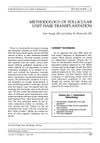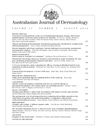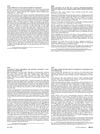 11 citations,
April 1999 in “Dermatologic Clinics”
11 citations,
April 1999 in “Dermatologic Clinics” Different hair transplant methods vary in time and cost, but the best results depend on hairline design and hair qualities, not just the technique.
[object Object]  August 2023 in “Clinical, Cosmetic and Investigational Dermatology”
August 2023 in “Clinical, Cosmetic and Investigational Dermatology” The new hair transplant device reduces damage to hair follicles and makes surgery more comfortable for the surgeon.
 105 citations,
February 2017 in “British Journal of Dermatology”
105 citations,
February 2017 in “British Journal of Dermatology” Survivors of Stevens-Johnson syndrome/toxic epidermal necrolysis need ongoing care for various long-term health problems.
 65 citations,
January 2013 in “Cochrane library”
65 citations,
January 2013 in “Cochrane library” Some systemic treatments work for nail psoriasis but can have serious side effects.
 45 citations,
February 2019 in “Journal of Affective Disorders”
45 citations,
February 2019 in “Journal of Affective Disorders” Melatonin improved mental health and metabolism in women with PCOS.
 8 citations,
August 2021 in “Lupus Science & Medicine”
8 citations,
August 2021 in “Lupus Science & Medicine” Patients with cutaneous lupus are most concerned about self-consciousness, physical symptoms, and disease progression.
 July 2016 in “Australasian Journal of Dermatology”
July 2016 in “Australasian Journal of Dermatology” The journal covered various dermatology topics, including treatments, disease management, and research findings.
 2 citations,
September 2016 in “Drug and therapeutics bulletin”
2 citations,
September 2016 in “Drug and therapeutics bulletin” Treating hidradenitis suppurativa needs long-term care and teamwork among doctors, but there's a lack of strong guidance on how to do it.
 March 2023 in “Seminars in reproductive medicine”
March 2023 in “Seminars in reproductive medicine” PCOS often leads to sleep problems, especially obstructive sleep apnea, affecting overall health.
 July 2018 in “British Journal of Dermatology”
July 2018 in “British Journal of Dermatology” Mindfulness reduces anxiety and depression in skin disease patients; dermatologists and psychiatrists often lack confidence in treating psychodermatological conditions.
 April 2016 in “Journal of The American Academy of Dermatology”
April 2016 in “Journal of The American Academy of Dermatology” Online medical education helps doctors make better clinical decisions and increases their knowledge in treating fungal nail infections.
 July 2015 in “British Journal of Dermatology”
July 2015 in “British Journal of Dermatology” Treating skin conditions with both psychological and dermatological care improves patient outcomes and can save costs.
January 2023 in “Dermatologic Therapy” Androgenetic alopecia significantly affects mental health and quality of life, highlighting the need for psychiatric evaluations.
 1 citations,
February 2022 in “PLOS ONE”
1 citations,
February 2022 in “PLOS ONE” Hair loss is more common in male Chinese college freshmen, and it's linked with rosacea but doesn't affect their quality of life.
 2 citations,
August 2021 in “Australasian Journal of Dermatology”
2 citations,
August 2021 in “Australasian Journal of Dermatology” Acne in adult women is often linked to polycystic ovary syndrome, especially in those who are younger, have premenstrual acne flare-ups, and irregular periods.
202 citations,
January 2022 in “Journal of Clinical Medicine” Women are more likely to have long-term post-COVID symptoms than men.
 December 2024 in “Journal of Cutaneous and Aesthetic Surgery”
December 2024 in “Journal of Cutaneous and Aesthetic Surgery” Advanced FUE systems have evolved to improve precision and efficiency in hair transplantation.
 November 2023 in “Computational and Structural Biotechnology Journal”
November 2023 in “Computational and Structural Biotechnology Journal” A single robotic system can accurately harvest and implant hair grafts, showing promise for real-world use.
 December 2022 in “Dermatology and Therapy”
December 2022 in “Dermatology and Therapy” Alopecia areata needs more recognition and better treatment access in Latin America to improve patient care and outcomes.
 1 citations,
April 2018 in “Revista da Sociedade Portuguesa de Dermatologia e Venereologia”
1 citations,
April 2018 in “Revista da Sociedade Portuguesa de Dermatologia e Venereologia” Hidradenitis suppurativa is a chronic skin condition more common in women, linked to genetics and lifestyle factors, and associated with various other health issues.
 August 2024 in “PLoS ONE”
August 2024 in “PLoS ONE” Combining PRP with Minoxidil improves hair density and thickness more than Minoxidil alone.
 5 citations,
August 2018 in “International Journal of Dermatology”
5 citations,
August 2018 in “International Journal of Dermatology” Men with sleep apnea and low iron levels are more likely to have male-pattern baldness, especially if they have a family history of hair loss.
 January 2018 in “Springer eBooks”
January 2018 in “Springer eBooks” PDE inhibitors, especially PDE4 inhibitors like apremilast, are effective for certain inflammatory skin conditions but have side effects and can be costly.
 10 citations,
January 2017 in “Expert Opinion on Pharmacotherapy”
10 citations,
January 2017 in “Expert Opinion on Pharmacotherapy” The conclusion is that more research is needed to better understand and treat adult acne, and that patient education and simple treatment plans are important for better results.
 36 citations,
June 2017 in “Journal of Cutaneous Medicine and Surgery”
36 citations,
June 2017 in “Journal of Cutaneous Medicine and Surgery” The consensus document recommends a comprehensive treatment plan for Hidradenitis Suppurativa, including various medications, surgery, lifestyle changes, and the need for more research and resources.
 34 citations,
August 2005 in “Dermatologic Clinics”
34 citations,
August 2005 in “Dermatologic Clinics” Stress and emotional factors can worsen skin conditions by affecting the immune system.
 31 citations,
May 2012 in “European Journal of Dermatology”
31 citations,
May 2012 in “European Journal of Dermatology” Menopause affects hair and skin; more research needed for treatment.
 1 citations,
November 2022 in “World Family Medicine Journal /Middle East Journal of Family Medicine”
1 citations,
November 2022 in “World Family Medicine Journal /Middle East Journal of Family Medicine” People in Jeddah know about Vitamin D and its sources but are unclear on how much they need daily, and while many women take supplements, attitudes towards increasing Vitamin D levels vary.
 1 citations,
January 2017 in “Expert opinion on orphan drugs”
1 citations,
January 2017 in “Expert opinion on orphan drugs” Adalimumab is the most effective treatment for severe hidradenitis suppurativa, but more research is needed to improve treatment options.
[object Object]  February 2024 in “medRxiv (Cold Spring Harbor Laboratory)”
February 2024 in “medRxiv (Cold Spring Harbor Laboratory)” The study aims to understand how mood, physical activity, light exposure, and seasonal changes affect sleep patterns.




























